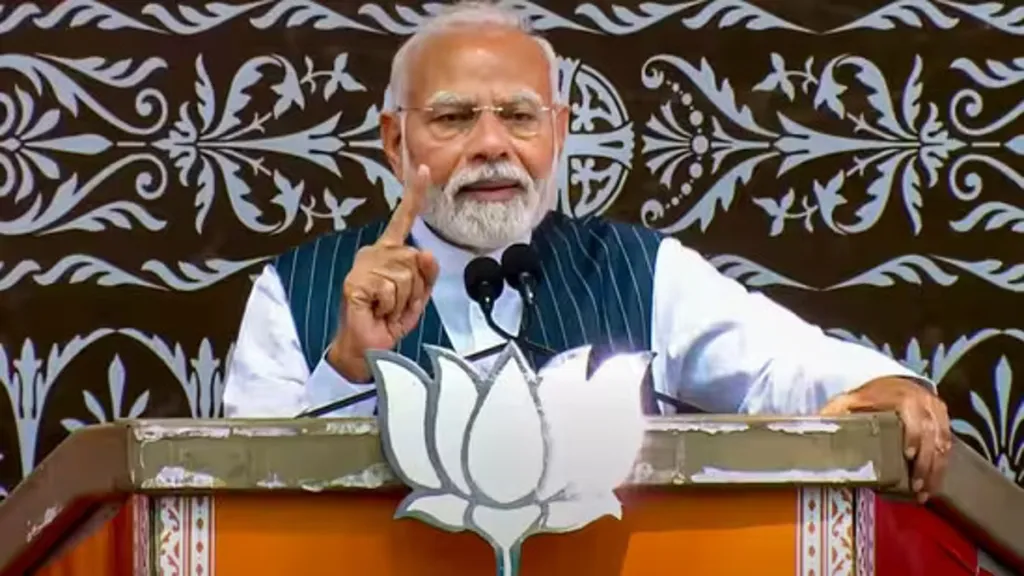By Farooq Wani
In the week gone by, Prime Minister Narendra Modi undertook his fourth visit to J&K in seven months, sending out a message of this region’s overarching importance in India’s domestic and geopolitical scheme of things. His visits to Doda (September 14) and Srinagar and Katra (September 19), again brought the twin issues of terrorism and socio-economic development to the forefront.
His two previous visits (in February and June) were almost entirely devoted to announcement of development-related initiatives worth thousands of crores as part of his government’s winning of hearts outreach. During his latest visit, Modi’s agenda has been more direct in terms of content and realpolitik, i.e., telling all Kashmiris that now’s the time to responsibly make a choice about their future- as a society and people. It was clearly focused at winning the “electoral numbers” game.
His appeal to the masses to cast their votes wisely in the ongoing Assembly polls came in his third public rally in a week in Katra. Similar appeals were also made in Srinagar and Doda. The theme of the appeal was “Kashmiris, secure your future by ensuring the political sunset of the Congress, National Conference and the People’s Democratic Party, which have inflicted wounds in the region for years together.”
While in Doda, Modi made a pointed reference to the issue of terrorism. Blaming the NC, the PDP and the Congress for allowing terrorism and separatism to flourish during their respective rules, he said the 2024 assembly election is now between these three dynastic families and the youth of J&K.
“On one side, there are those three families and on the other, my daughters and sisters who are driven by their dreams,” Modi said, adding that terrorism “is taking its last breath in J&K.” This was a timely statement given in the context of a surge in terror attacks in the Jammu division in June and July and his government and security matrix’s determination to cut and counter it at its roots.
The Prime Minister and BJP functionaries are telling voters that if they desire taking J&K to new heights, then they should cast their ballots to ensure BJP victory in J&K’s 90 assembly constituencies. Modi speeches were focused on a call to end dynastic and family-based rule in J&K and conveyed a clear message to Pakistan (and by extension the international community) that since it had inflicted deep wounds and decades of socio-economic discrimination across the region, no power can or should think of restoring Article 370.
However, Pakistan has expectedly commented on the elections in J&K with Pakistan Defence Minister Khawaja Asif stating that the PML-led government in Islamabad was on the same page as the Indian National Congress (INC)-National Conference (NC) alliance in J&K on the issue of the restoration of Articles 370 & 35A. He even said that Pakistan saw the INC-NC alliance emerging as victors, or at least as a combine with the most votes in the UT Assembly polls.
While NC has vowed to restore Article 370 and 35 A, INC has only committed restoration of full statehood to J&K. However, since both articles are still an emotive issue for Kashmiris, particularly for those living in the valley INC remains delightfully vague about its stance on restoration of these Articles.
The first phase of the three-phased polling in J&K on September 18 covered 24 constituencies in seven South Kashmir districts and the Chenab Valley region. As per the UT election commission data, a little over 61 percent voting was registered, which is a record. Modi’s rallies in Srinagar and Katra significantly came a day after.
The other significant development is the banned Jamaat-e-Islami (JeI) taking part in the elections indirectly. We are seeing independent candidates backed by the JeI joining the poll fray and creating political ripples in J&K. Former JeI leaders also voted in this year’s general elections and openly said they were ready to take part in the electoral process if the Union Home Ministry lifted the five-year-old ban on them. Earlier this month, they even organised a huge rally in the village of Bogam in South Kashmir’s Kulgam district to garner support for an independent candidate.
The more than 61 percent voter turnout (61.11 percent) to determine the fate of 219 candidates, including 90 Independents in the first phase of assembly polls is the highest in the past four Lok Sabha and three assembly elections. There is now hope that the remaining two phases of assembly elections (on September 25 and October 1) will also witness large voter turnouts given the prevailing stable and peaceful environment in which these elections are being held. Necessary security presence to avoid untoward mishaps has further strengthened voter confidence.
The political situation on ground, however, remains fluid and uncertain, with certain sections expecting a hung electoral result. Should that eventuality take place, we can then expect the Lt. Governor’s office and courts to take centre-stage to decide the constitutionally appropriate way forward.
Whatever be the outcome of elections, it’s the record-breaking voter turnout in the first phase of assembly polls that showcases to the world, the confidence and trust of the people of J&K in this free and fair democratic exercise that out rightly debunks Pakistan’s claims of what it desperately tries to portray as “sham elections.”
The author is Editor Brighter Kashmir, Author, TV commentator, political analyst and columnist.
Disclaimer: Views expressed are personal and do not reflect the official position or policy of FinancialExpress.com Reproducing this content without permission is prohibited.


